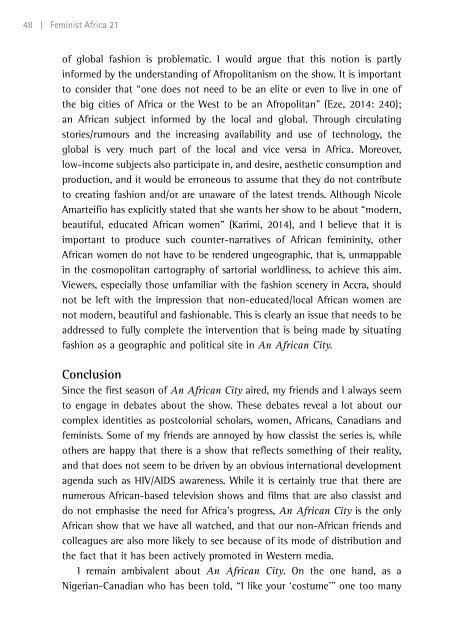The politics of fashion and beauty in Africa
fa21_proof_3
fa21_proof_3
Create successful ePaper yourself
Turn your PDF publications into a flip-book with our unique Google optimized e-Paper software.
48 | Fem<strong>in</strong>ist <strong>Africa</strong> 21<br />
<strong>of</strong> global <strong>fashion</strong> is problematic. I would argue that this notion is partly<br />
<strong>in</strong>formed by the underst<strong>and</strong><strong>in</strong>g <strong>of</strong> Afropolitanism on the show. It is important<br />
to consider that “one does not need to be an elite or even to live <strong>in</strong> one <strong>of</strong><br />
the big cities <strong>of</strong> <strong>Africa</strong> or the West to be an Afropolitan” (Eze, 2014: 240);<br />
an <strong>Africa</strong>n subject <strong>in</strong>formed by the local <strong>and</strong> global. Through circulat<strong>in</strong>g<br />
stories/rumours <strong>and</strong> the <strong>in</strong>creas<strong>in</strong>g availability <strong>and</strong> use <strong>of</strong> technology, the<br />
global is very much part <strong>of</strong> the local <strong>and</strong> vice versa <strong>in</strong> <strong>Africa</strong>. Moreover,<br />
low-<strong>in</strong>come subjects also participate <strong>in</strong>, <strong>and</strong> desire, aesthetic consumption <strong>and</strong><br />
production, <strong>and</strong> it would be erroneous to assume that they do not contribute<br />
to creat<strong>in</strong>g <strong>fashion</strong> <strong>and</strong>/or are unaware <strong>of</strong> the latest trends. Although Nicole<br />
Amarteifio has explicitly stated that she wants her show to be about “modern,<br />
beautiful, educated <strong>Africa</strong>n women” (Karimi, 2014), <strong>and</strong> I believe that it is<br />
important to produce such counter-narratives <strong>of</strong> <strong>Africa</strong>n fem<strong>in</strong><strong>in</strong>ity, other<br />
<strong>Africa</strong>n women do not have to be rendered ungeographic, that is, unmappable<br />
<strong>in</strong> the cosmopolitan cartography <strong>of</strong> sartorial worldl<strong>in</strong>ess, to achieve this aim.<br />
Viewers, especially those unfamiliar with the <strong>fashion</strong> scenery <strong>in</strong> Accra, should<br />
not be left with the impression that non-educated/local <strong>Africa</strong>n women are<br />
not modern, beautiful <strong>and</strong> <strong>fashion</strong>able. This is clearly an issue that needs to be<br />
addressed to fully complete the <strong>in</strong>tervention that is be<strong>in</strong>g made by situat<strong>in</strong>g<br />
<strong>fashion</strong> as a geographic <strong>and</strong> political site <strong>in</strong> An <strong>Africa</strong>n City.<br />
Conclusion<br />
S<strong>in</strong>ce the first season <strong>of</strong> An <strong>Africa</strong>n City aired, my friends <strong>and</strong> I always seem<br />
to engage <strong>in</strong> debates about the show. <strong>The</strong>se debates reveal a lot about our<br />
complex identities as postcolonial scholars, women, <strong>Africa</strong>ns, Canadians <strong>and</strong><br />
fem<strong>in</strong>ists. Some <strong>of</strong> my friends are annoyed by how classist the series is, while<br />
others are happy that there is a show that reflects someth<strong>in</strong>g <strong>of</strong> their reality,<br />
<strong>and</strong> that does not seem to be driven by an obvious <strong>in</strong>ternational development<br />
agenda such as HIV/AIDS awareness. While it is certa<strong>in</strong>ly true that there are<br />
numerous <strong>Africa</strong>n-based television shows <strong>and</strong> films that are also classist <strong>and</strong><br />
do not emphasise the need for <strong>Africa</strong>’s progress, An <strong>Africa</strong>n City is the only<br />
<strong>Africa</strong>n show that we have all watched, <strong>and</strong> that our non-<strong>Africa</strong>n friends <strong>and</strong><br />
colleagues are also more likely to see because <strong>of</strong> its mode <strong>of</strong> distribution <strong>and</strong><br />
the fact that it has been actively promoted <strong>in</strong> Western media.<br />
I rema<strong>in</strong> ambivalent about An <strong>Africa</strong>n City. On the one h<strong>and</strong>, as a<br />
Nigerian-Canadian who has been told, “I like your ‘costume’” one too many



